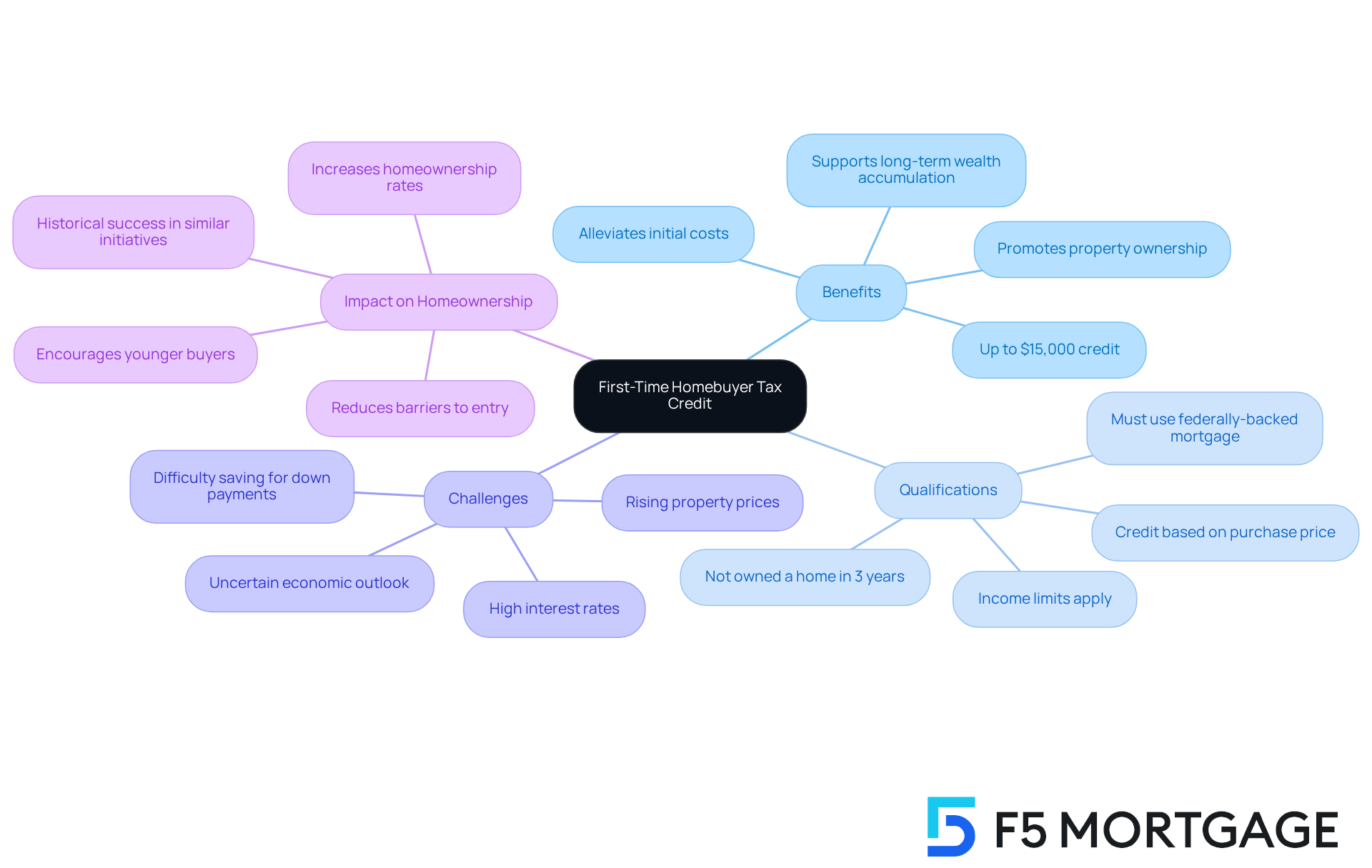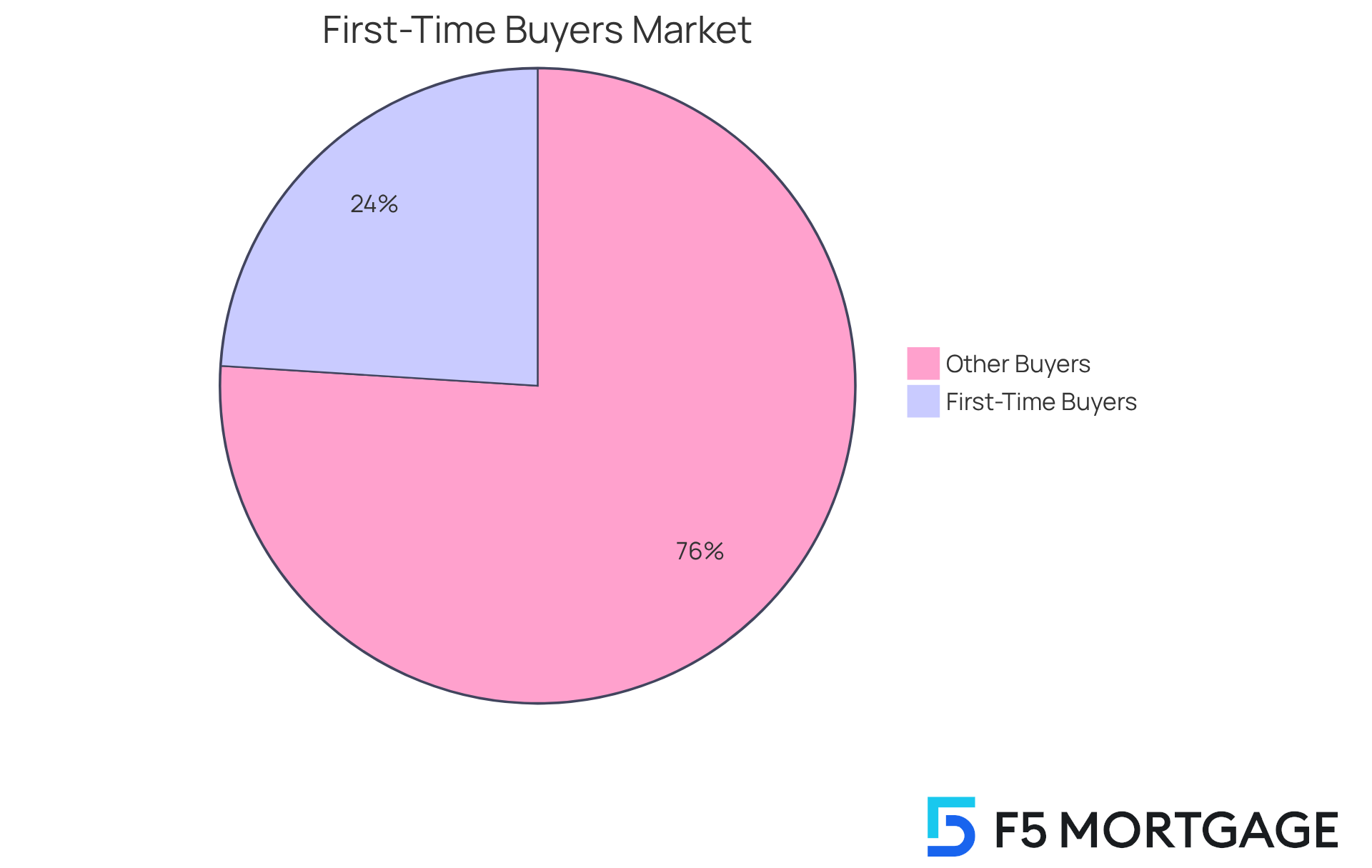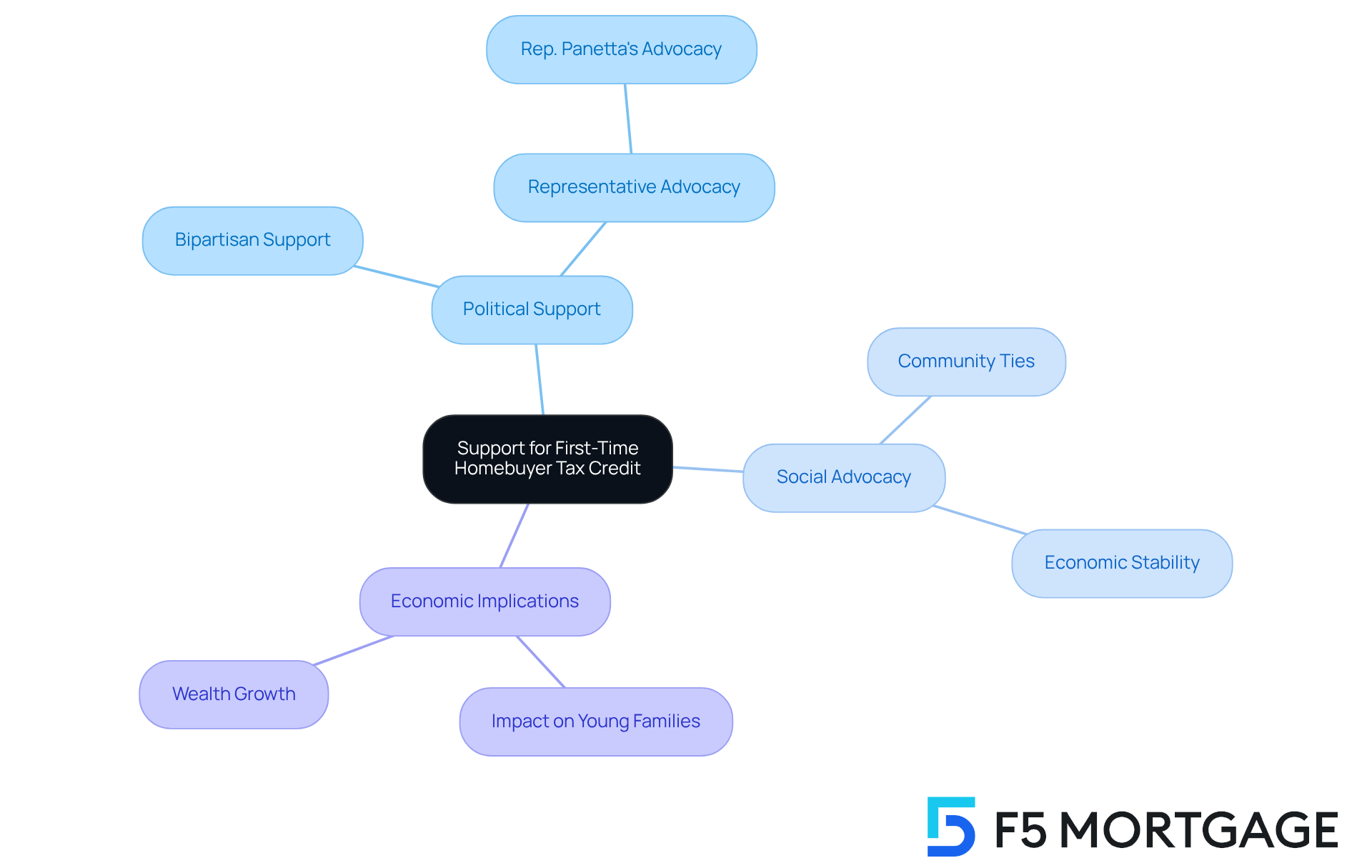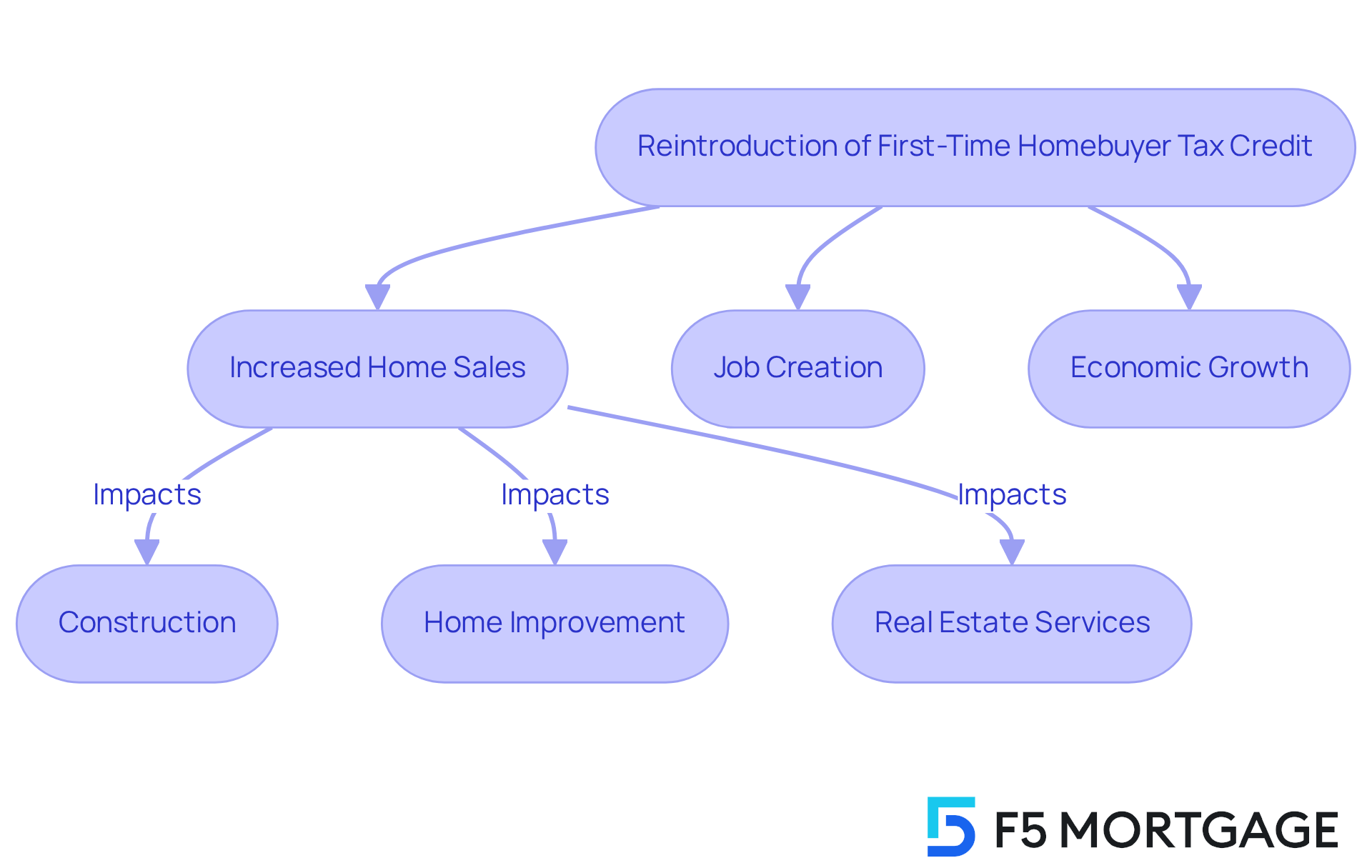Overview
The First-Time Homebuyer Tax Credit is poised to pass in 2025, and we know how significant this is for many families. With bipartisan support from lawmakers, there’s a recognition of the urgent need to tackle rising housing costs and make homeownership accessible for first-time buyers.
This tax incentive can significantly alleviate financial barriers. Historically, it has proven to increase homeownership rates, especially among younger individuals who are facing challenges in a tough housing market. We’re here to support you every step of the way as you navigate this process.
Understanding the impact of this credit can empower you to take action. By facilitating access to homeownership, it opens doors that may have seemed closed before. This is more than just a policy; it’s a pathway to a brighter future for families looking to establish roots and build their dreams.
Introduction
The proposed First-Time Homebuyer Tax Credit for 2025 has sparked an important conversation about the future of homeownership in a market that can feel daunting. With the possibility of providing up to $15,000 in tax relief, this initiative seeks to alleviate the financial stress that first-time buyers face amid rising property prices and high interest rates.
As bipartisan support grows for this incentive, we can’t help but wonder: will this tax credit pass, allowing a new generation of homeowners to realize their dreams in a time when affordability often seems just out of reach?
We understand how challenging this journey can be, and we’re here to support you every step of the way.
Understanding the First-Time Homebuyer Tax Credit
The proposed renewal of the First-Time Homebuyer Tax Incentive in 2025 raises concerns about whether the first-time homebuyer tax credit will pass, as it presents a wonderful opportunity for qualified first-time buyers, offering up to $15,000 as a refundable federal tax benefit. This initiative is designed to alleviate the financial pressure of purchasing a first home, ultimately promoting property ownership and supporting long-term wealth accumulation. This funding is particularly beneficial for those facing challenges with initial costs, making homeownership more attainable in a market characterized by rising property prices and interest rates.
To qualify, buyers must not have owned a home in the past three years, and the credit amount is determined by the property’s purchase price. This tax incentive is especially vital, considering that the national median sale price has now reached around $420,800. Many first-time buyers find it difficult to save for down payments, which generally average about 8% of the purchase price. In 2024, 38% of first-time homebuyers indicated that saving for a down payment was their biggest obstacle in financing a home.
The impact of such tax incentives on homeownership rates can be profound. Historical data shows that similar initiatives have successfully increased homeownership among younger buyers, particularly in states with their own versions of the tax incentive. Economists stress that tax credits can significantly reduce the barriers for potential homeowners, enabling them to invest in real estate and build equity over time. As the housing market continues to evolve, many hopeful buyers in 2025 are wondering, will the first-time homebuyer tax credit pass to enhance access to homeownership?

Current Housing Market Trends Impacting Tax Credit Support
In 2025, the housing market presents significant challenges for many first-time buyers, with property prices and interest rates remaining consistently high. We understand how daunting this can be. The average property price has surged sharply, with some areas witnessing increases of over 10% year-over-year. As of August 2025, mortgage rates hover around 6.93%, further complicating affordability for hopeful homeowners.
This combination of factors has led to a concerning decline in first-time homebuyers, who now represent only 24% of the market—the lowest percentage we’ve seen in recent history. The effects of rising home prices are particularly felt among younger individuals, who often struggle to save for down payments and meet loan qualifications.
In response to these pressing issues, a proposed first-time buyer tax incentive raises the question of whether the first-time homebuyer tax credit will pass as a vital tool aimed at boosting demand and facilitating access to homeownership. This initiative has gained bipartisan support from lawmakers who recognize the urgent need for intervention in our current market landscape, particularly regarding whether will the first-time homebuyer tax credit pass. We’re here to support you every step of the way as we navigate these challenges together.

Political and Social Factors Driving Support for the Tax Credit
The political landscape surrounding the First-Time Homebuyer Tax Credit raises questions about whether the first-time homebuyer tax credit will pass, reflecting a growing awareness of the obstacles faced by young families and individuals with low to moderate incomes in their quest to buy a home. Lawmakers from both parties are coming together in support of this tax credit, recognizing it as an essential resource to tackle the rising housing costs that disproportionately affect first-time buyers, leading to the question: will the first-time homebuyer tax credit pass? This bipartisan support is exemplified by representatives like Rep. Panetta, who advocate for policies aimed at making housing more accessible for all Americans.
There’s a powerful story here that highlights how increased homeownership can lead to economic stability and wealth growth. Studies show that owning a home not only fosters deeper community ties but also enhances stability, underscoring its importance in achieving the American Dream. With the homeownership rate among younger households dropping to just 36.6% in early 2025, the urgency for effective solutions has never been clearer. The combination of political momentum and social advocacy creates a nurturing environment for the passage of this tax incentive, leading many to wonder, will the first-time homebuyer tax credit pass, as it aligns with the aspirations of countless families eager to secure their financial futures through homeownership.

Implications of the Tax Credit for Homebuyers and the Economy
The anticipated reintroduction of the First-Time Homebuyer Tax Credit will the first-time homebuyer tax credit pass and is set to bring significant benefits for both homebuyers and the broader economy. We understand how challenging it can be to acquire a property, and this financial support can help ease that burden, making the market more accessible for you. As affordability improves, we expect to see a notable increase in home sales, which will invigorate related sectors like construction, home improvement, and real estate services.
From an economic perspective, this tax credit is likely to create jobs and stimulate growth by fostering a more dynamic housing market. With more individuals achieving homeownership, communities may experience enhanced stability and investment, further strengthening local economies. This strategic intervention not only aims to revitalize the housing market but also raises concerns about whether the first-time homebuyer tax credit will pass to support the financial well-being of first-time buyers. We’re here to support you every step of the way, contributing to a healthier economic landscape for all.

Conclusion
The potential passage of the First-Time Homebuyer Tax Credit in 2025 represents a crucial step toward making homeownership attainable for many individuals and families facing escalating housing costs. We know how challenging this can be. This initiative not only aims to provide financial relief but also seeks to foster a more inclusive housing market that empowers first-time buyers to invest in their futures.
Throughout the discussion, it has been highlighted that the current housing market is fraught with challenges. Soaring property prices and high interest rates have significantly reduced the percentage of first-time buyers. The proposed tax credit, offering up to $15,000, stands as a beacon of hope. It has gained bipartisan support from lawmakers who recognize the pressing need for effective solutions. Historical data underscores the positive impact of similar initiatives on homeownership rates, particularly among younger demographics.
Ultimately, the implications of this tax credit extend beyond individual homebuyers. It has the potential to invigorate the economy by stimulating job creation and enhancing community stability. As the political and social momentum builds around this initiative, it is essential to advocate for policies that promote equitable access to homeownership. We’re here to support you every step of the way. Ensuring the passage of the First-Time Homebuyer Tax Credit could be a transformative measure, paving the way for countless families to achieve their dreams of homeownership and contributing to a more robust economic landscape for all.
Frequently Asked Questions
What is the First-Time Homebuyer Tax Credit?
The First-Time Homebuyer Tax Credit is a proposed federal tax benefit offering up to $15,000 as a refundable credit for qualified first-time buyers, aimed at easing the financial burden of purchasing a first home.
Who qualifies for the First-Time Homebuyer Tax Credit?
To qualify for the tax credit, buyers must not have owned a home in the past three years.
How is the amount of the tax credit determined?
The amount of the tax credit is determined by the property’s purchase price.
Why is the First-Time Homebuyer Tax Credit important?
The tax credit is important because it helps make homeownership more attainable for first-time buyers, especially in a market with rising property prices and interest rates.
What challenges do first-time homebuyers face regarding down payments?
Many first-time homebuyers struggle to save for down payments, which typically average about 8% of the purchase price. In 2024, 38% of first-time buyers reported that saving for a down payment was their biggest obstacle.
How have similar tax incentives impacted homeownership rates?
Historical data indicates that similar tax incentives have successfully increased homeownership rates among younger buyers, particularly in states with their own versions of the tax incentive.
What is the current state of the housing market related to this tax credit?
The national median sale price of homes has reached around $420,800, making the need for financial assistance through tax credits more pressing for potential homebuyers.
What are the prospects for the First-Time Homebuyer Tax Credit in 2025?
As of now, there are concerns about whether the proposed renewal of the First-Time Homebuyer Tax Credit will pass in 2025, which could significantly enhance access to homeownership for many buyers.








